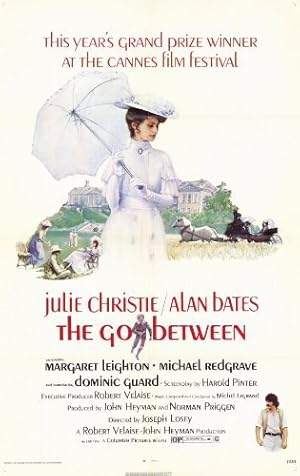
The Go-Between Page #2
- GP
- Year:
- 1971
- 116 min
- 239 Views
Have you written to her, Leo ?
- Yes, I have.
- Good.
You've chosen very well, Marian. Did
you do any shopping for yourself ?
Oh, no, mama. That can wait.
It mustn't wait too long.
You didn't see anyone in Norridge,
I suppose ?
Not a soul. We were hard at it all
the time, weren't we, Leo ?
Yes, we were.
Your mother has written to me that
you are liable to colds.
But you can watch the others
bathe, of course.
Why are you bringing your bathing
suit if you're not allowed to swim ?
It's just a bathing party.
But you're not going to swim.
I know I'm not.
In that case, why ?
What cheek ! The man's trespassing.
What should we do ?
Order him off.
What cheek !
Who can he be ?
I don't know.
He's a good swimmer.
Don't you think ?
Come on, Jane. Let's go and change.
Shall we order him off ?
- It's Ted Burgess.
- Who's he ?
The tenant of Blackfarm.
We can't be rude to him.
He farms the land on the other side.
Perhaps you'd better be nice to him.
I should just say how do you do.
We don't know him socially, of course.
But I think I'd better be nice
to him, don't you ?
I would say so.
I didn't know anyone was going
to be here.
Just started on the harvest.
- It got so hot.
- Don't worry at all, please.
We were hot too, up at the hall.
Very hot.
I won't be long. Just one more header.
Absolutely, absolutely.
I think I put him at his ease, don't you ?
I shouldn't put on a bathing suit
if you're not going to swim.
It would look absurd.
What do you think you're doing ?
I'll get you for that.
No.
Revenge !
No ! Stop it.
I'll get you for that.
My hair's gone down. It's all wet.
I'll never get it dry.
Oh, you do look so dry and smug.
I should like to throw you in the river.
Is that man gone ?
Yes. He went off in a hurry.
His name is Ted Burgess.
He's a farmer.
Do you know him ?
Oh, I may have met him.
Oh, it's dripping on my dress.
Here's my bathing suit.
It's quite dry.
If you fasten it around your neck,
so that it hangs down your back...
...then you can spread your hair on it,
and your hair will get dry
and your dress won't get wet.
Spread my hair on it.
Take care not to pull it.
Is it well spread ?
Is it dry ?
What a comfort.
Your bathing suit on my shoulders.
Is my hair well spread ?
Oh yes, it is.
See then that ye walk circumspectly,
not as fools, but as wise,
redeeming the time because
the days are evil.
Wherefore be not unwise,
but understanding what
the will of the Lord is.
And be not drunk with wine,
wherein is excess.
But be filled with the spirit,
speaking to yourselves in psalms
and hymns and spiritual songs,
singing and making melody
Translation
Translate and read this script in other languages:
Select another language:
- - Select -
- 简体中文 (Chinese - Simplified)
- 繁體中文 (Chinese - Traditional)
- Español (Spanish)
- Esperanto (Esperanto)
- 日本語 (Japanese)
- Português (Portuguese)
- Deutsch (German)
- العربية (Arabic)
- Français (French)
- Русский (Russian)
- ಕನ್ನಡ (Kannada)
- 한국어 (Korean)
- עברית (Hebrew)
- Gaeilge (Irish)
- Українська (Ukrainian)
- اردو (Urdu)
- Magyar (Hungarian)
- मानक हिन्दी (Hindi)
- Indonesia (Indonesian)
- Italiano (Italian)
- தமிழ் (Tamil)
- Türkçe (Turkish)
- తెలుగు (Telugu)
- ภาษาไทย (Thai)
- Tiếng Việt (Vietnamese)
- Čeština (Czech)
- Polski (Polish)
- Bahasa Indonesia (Indonesian)
- Românește (Romanian)
- Nederlands (Dutch)
- Ελληνικά (Greek)
- Latinum (Latin)
- Svenska (Swedish)
- Dansk (Danish)
- Suomi (Finnish)
- فارسی (Persian)
- ייִדיש (Yiddish)
- հայերեն (Armenian)
- Norsk (Norwegian)
- English (English)
Citation
Use the citation below to add this screenplay to your bibliography:
Style:MLAChicagoAPA
"The Go-Between" Scripts.com. STANDS4 LLC, 2024. Web. 24 Apr. 2024. <https://www.scripts.com/script/the_go-between_20325>.


Discuss this script with the community:
Report Comment
We're doing our best to make sure our content is useful, accurate and safe.
If by any chance you spot an inappropriate comment while navigating through our website please use this form to let us know, and we'll take care of it shortly.
Attachment
You need to be logged in to favorite.
Log In